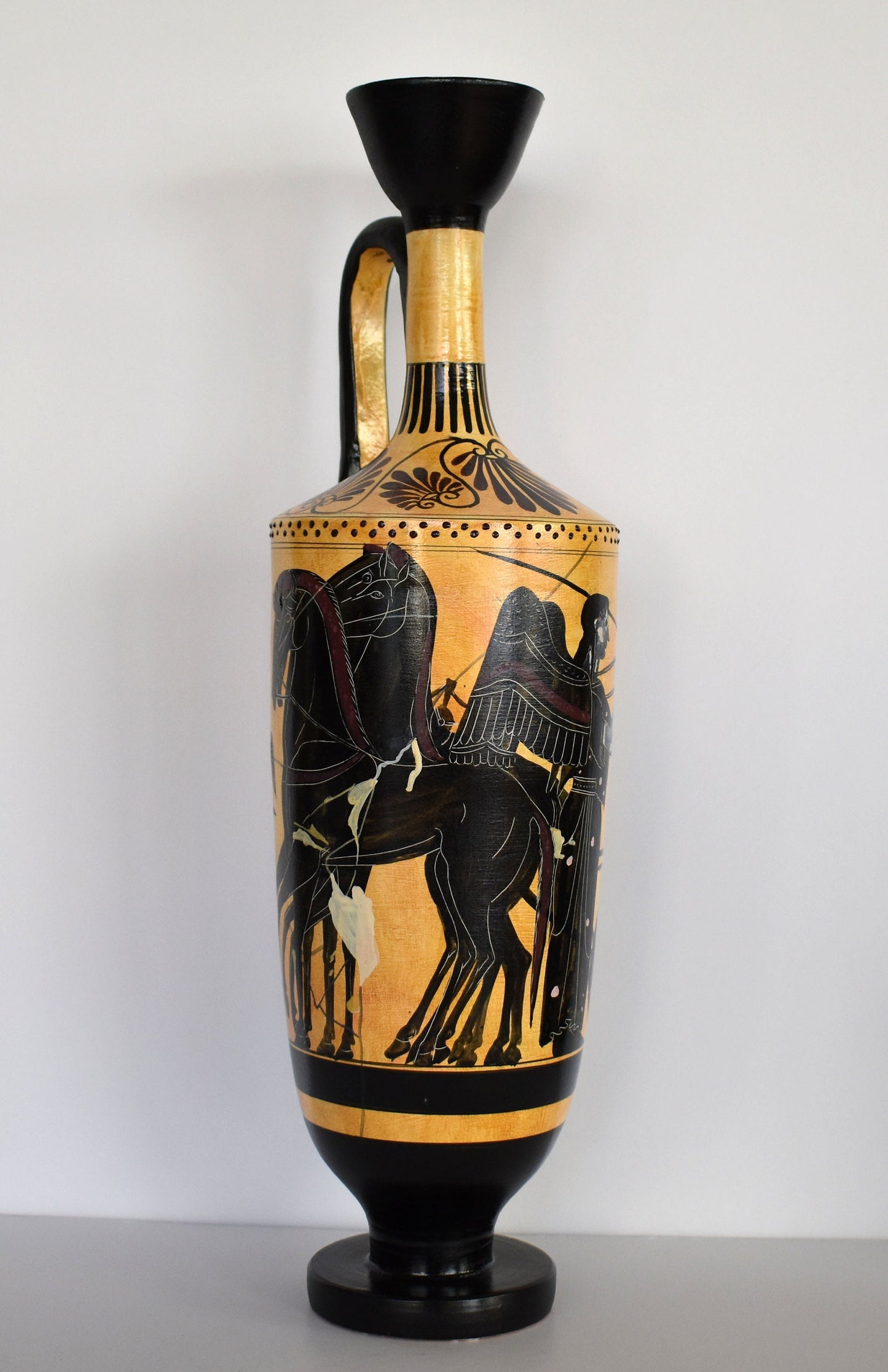Gallery Demeter
Achilles drags the Corpse of Hector with his chariot - Lekythos - 510 BC - Delos Museum - Ceramic Vase
Achilles drags the Corpse of Hector with his chariot - Lekythos - 510 BC - Delos Museum - Ceramic Vase
Regular price
€499,90 EUR
Regular price
Sale price
€499,90 EUR
Unit price
per
Tax included.
Shipping calculated at checkout.
Couldn't load pickup availability
Item Specifics
Condition: New, Handmade in Greece.
Material: Clay
Height Size: 40 cm - 15,7 inches
Width: 12 cm - 4,7 inches
Length: 12 cm - 4,7 inches
Weight: 1280 g
Achilles, according to legend, was half-immortal: his mother, a sea-nymph, dipped him into the River Styx when he was only a baby. This meant he was completely indestructible— all except for his heel, which his mother used to hold him when she dipped him into the water. According to The Poet, he is the greatest warrior that ever lived: "bigger than Heracles, bigger than Sinbad, bigger than . . . well, who's the greatest warrior living now?" His life is surrounded by the supernatural; he was raised by a centaur, he can speak to animals, and it's been prophesied that he'll die in Troy. More important than all this, though, is Achilles' character; he is extremely prideful, vengeful, and quick to anger.
Hector, on the other hand, was all mortal. He was the son of Priam, the king of Troy. It was his brother, Paris, that kidnapped Helen and started off the entire war. And just like Achilles, Hector is very prideful. He refuses to retreat, he refuses to let anyone else lead the battles against the Greeks, and he refuses, most of all, to surrender to the other side. Even when his wife and child beg him to call off the fighting, he won't do it. He would rather die in the glory of battle than live with defeat.
Achilles, in his pride, refuses to fight against the Trojans; he's been offended by the Greek leader, so he lets the army suffer and falter in order to prove a point. Hector, on the other hand, fights wholeheartedly; he wants to defend his country and his family, so he gives the battle his all. But he’s not only fighting to defend his country; he’s fighting for the glory of it. “He won’t let anyone else lead the charge for Troy. . . . He wants to be in charge. Complicated. Full of hubris.” He's the one who eventually ends up killing Achilles' best friend, Patroclus. And it's only Patroclus' death that finally spurs Achilles to fight.
Hector wants to battle Achilles to avenge his country and defend it against future Greek attacks. In An Iliad, he considers reasoning with Achilles, but his pride overcomes him. Similarly, instead of letting bygones be bygones, Achilles swears vengeance on Hector and goes after him and his armies. It's their fight to the death that sits at the heart of the play.
What makes these characters so similar? In a word, it's their pride. Neither one is willing to lose or to concede anything, even if it is for a greater good. Instead, each character lets his pride fuel his rage and his desire for vengeance. Each has a passionate love for and loyalty toward others; Hector cares for his wife and son more than anything. In An Iliad, we see his tenderness and love as he speaks with his baby son, and we see his worry for his wife. Likewise, Achilles has an intense attachment to two characters: his lover Briseis and his best friend Patroclus. We learn in the play that "Patroclus and Achilles were more than friends, they were brothers. And really they were more than brothers, they loved each other."
We learn that both Achilles and Hector are good men. They are driven by courage and nobility; they want only to defend and avenge their loved ones. Each of them is their respective side's best warrior. It's no wonder that Homer wrote so much about them. But ultimately, it's their pride and anger that destroys them. An Iliad shows us that each character lets his pride overcome everything he loves until there's nothing left but rage and war.
Even though they seem very different when you first look at them, Hector and Achilles are very alike; they are men who want what is best for themselves and for their loved ones. The beauty of love and loyalty and the dangers of pride and anger and a beautiful, but sad, tale portrayed in exquisite language and masterful storytelling.









